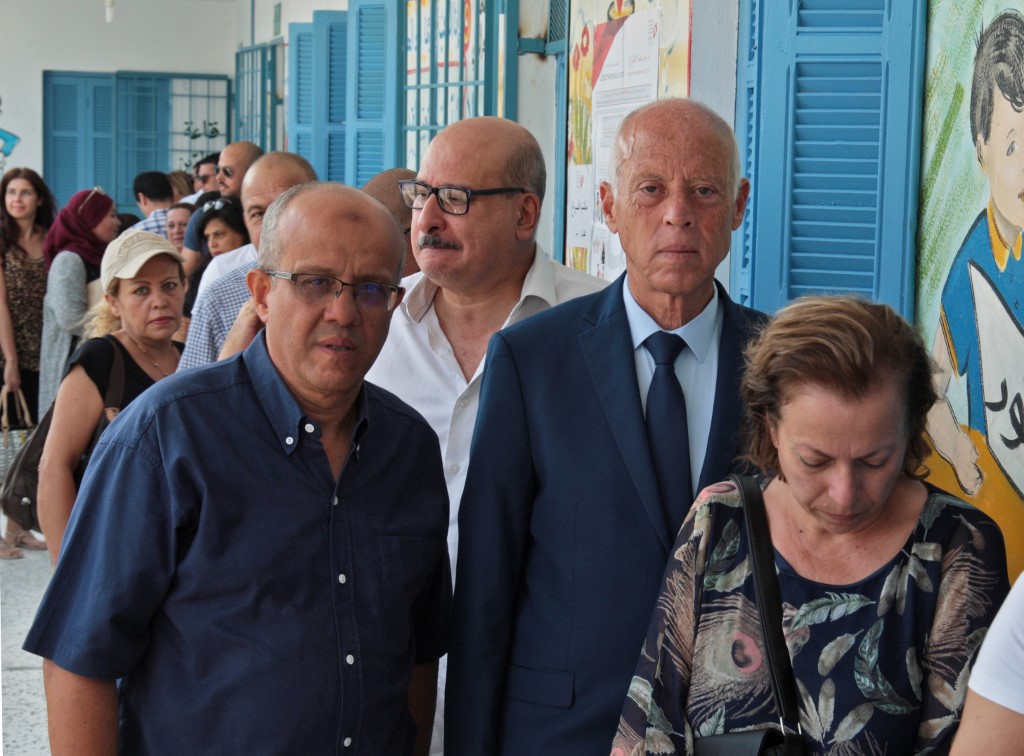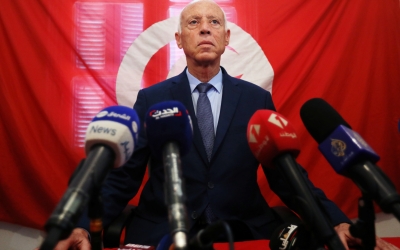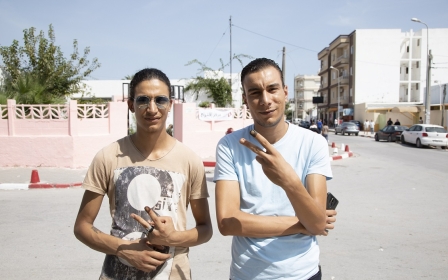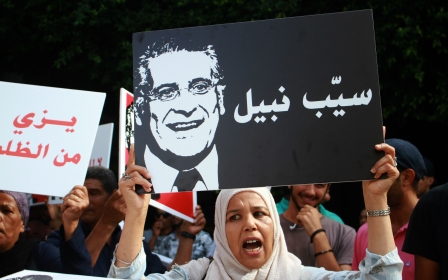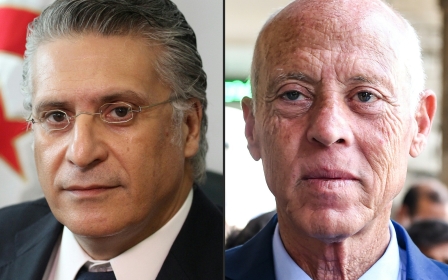Why Kais Saied is poised to become Tunisia's next president
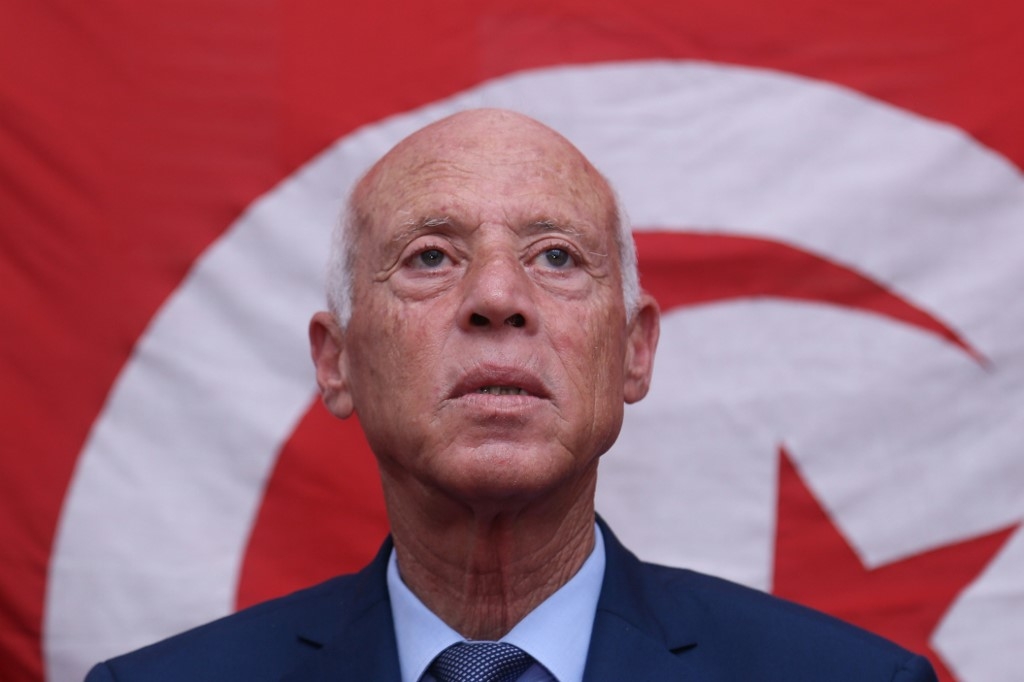
With a runoff vote looming, it appears likely that Kais Saied, a constitutional law professor who ran almost no electoral campaign, is on track to become Tunisia’s next president.
Unexpected by most observers, this development will have a major impact on the country’s political landscape, with legislative elections also in the offing.
Two surprising names were victorious in the first round of voting earlier this month: Saied and imprisoned media mogul Nabil Karoui, with around 18 percent of the vote and 15 percent, respectively. Depicted as Tunisia’s equivalent of former Italian Prime Minister Silvio Berlusconi, Karoui is known for owning Nessma, a widely watched TV channel throughout the Maghreb. Saied is far less known.
Humble profile
Before the revolution, Saied’s only known public activities were in civil society, where he reportedly served as the secretary-general of the Tunisian Association of Constitutional Law during the 1990s. In the early years after the revolution, he gained prominence as a regular TV commentator, debating the constitution and defending the revolution. He became a symbol of anti-elitism due to his humble profile, refusing public money to fund his campaign.
New MEE newsletter: Jerusalem Dispatch
Sign up to get the latest insights and analysis on Israel-Palestine, alongside Turkey Unpacked and other MEE newsletters
Saied quickly emerged as a frontrunner in polls as the election neared, but his first-place victory came as a surprise to most observers, with no party supporting him and no large electoral campaign to speak of. He mostly avoided media appearances and events with other candidates.
One of the most intriguing questions will be how the political wave propelling Saied ahead will impact the upcoming legislative elections
It is likely that he will win in the runoff, for a number of reasons. Firstly, if he wins votes from the large, urban, middle-class electoral base of former candidates who are close to his political line, he would likely surpass the 50 percent threshold. This would cover a wide array of candidates, from the secular social democrat Mohamed Abbou, to the Islamist Ennahda’s candidate, Abdelfattah Mourou.
Secondly, Saied’s electoral base is strong and diverse, covering much of the country, from the south to the big electoral blocs of Greater Tunis and the Sahel. He is very popular among the urban middle class, with his discourse emphasising basic anti-elitist ideas, such as volunteering rather than making money from a political career, and returning “power to the people”. His supporters range from radical leftists to hard conservatives.
Tunisian populism
At the same time, Karoui is falling in the polls due to the image of corruption; as such, few public figures or politicians have declared their support for him in the second round. While being in prison might have galvanised his base in the first round, his continuing confinement may hinder him being taken seriously by large sections of the middle class, who lean more towards a stable political process.
One of the most intriguing questions will be how the political wave propelling Saied ahead will impact the upcoming legislative elections. He not only lacks a party, but he has rejected participation in legislative elections. Paradoxically, he refuses to use the legislative tool, which is far more powerful than Tunisia’s presidential system - and this could lead to further complications down the road.
Political scientist Cas Mudde’s definition of populism, adopted by many experts, defines it as a polarisation between the “elite” and the “people”. But what is the Tunisian version of populism?
On 15 September, an overwhelming wave of populism took two “anti-elitist” candidates to the second round of the country’s presidential election. All year, polls have been steadily favouring Karoui and Saied in the presidential race, along with new parties in the October legislative elections, including Karoui’s newly formed Heart of Tunisia and Aich Tounsi, an association led by Olfa Terras that subsequently became a political party.
The path forward
If anything, the results of the first round of the presidential election revealed that voters are not simply drawn to the unique profiles of Saied and Karoui, but more importantly, they want to wipe away a political elite that is perceived as disconnected from the public and corrupt.
In the early years after the revolution, the main criticism of the government was that it missed important opportunities to combat corruption. Then, in 2015, the compromise between Ennahda and Nidaa Tounes weakened the opposition.
A recent unpublished poll for Tunisia’s legislative elections shows Qalb Tounes as a frontrunner, trailed by Ennahda and the "party of Kais Saied", even though he does not have a party and does not believe in the party-lists system, voters apparently want him to be present in parliament.
Who will ultimately benefit from the wave of support for Saied? This is a question that can only be answered in the days ahead.
The legislative elections
But the trend of the presidential election is indicative of a similar pattern in the legislatives elections. First, we are going to see many parties with small portions of votes and very close to each other.
Second, this may indicate that we will have a parliament with many blocs. The majority will be either made up of very newly formed parties such as Nabil Karoui’s Qalb Tounes or independent coalitions such as Aish Tounsi. Obviously this will make the task of forming the government after the elections even more difficult.
Thirdly, Ennahdha is probably going to continue to be a major player but it is already facing a growing competition over its conservative base from the radical Iitialf al-Karama (the Dignity Coalition), notably after its leader scored surprising results in the last presidential elections, capturing 4.4 percent of the electorate.
Iitilaf al-Karama may take over a seizable portion of Ennahdha’s base, which would weaken the party's ambitions to remain a kingmaker in the Tunisian political landscape.
The views expressed in this article belong to the author and do not necessarily reflect the editorial policy of Middle East Eye.
Middle East Eye delivers independent and unrivalled coverage and analysis of the Middle East, North Africa and beyond. To learn more about republishing this content and the associated fees, please fill out this form. More about MEE can be found here.



